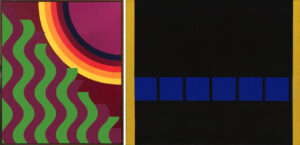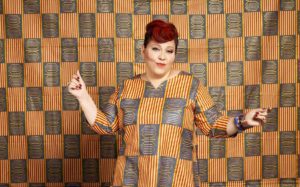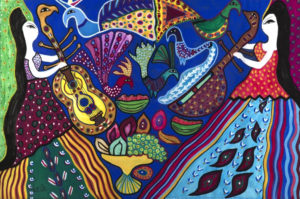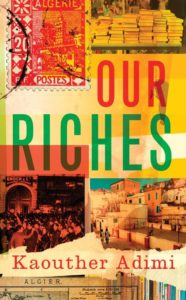Select Other Languages French.
Embattled Algerian-French author Kamel Daoud won France’s most prestigious literary prize for a story he is accused of stealing. Now, facing two international arrest warrants, the novelist is digging in his heels: “Is it a novel or a crime?”
On Friday, May 9, the Comédie du Livre — an annual literary festival held in Montpellier for the last 40 years — kicked off with a public interview featuring famed and controversial Algerian-French writer Kamel Daoud. The mood at the event was disconcerting. A large, cheerful crowd gathered before the Opéra Comédie, many holding copies of Daoud’s latest novel, Houris, waiting for the doors to open. But when they did, it was by two armed police officers, who proceeded to check purses and backpacks. Security officers inside gave everyone a thorough pat down. Once the event finally began, Daoud himself appeared stern, seated onstage with arms crossed, unsmiling, eyes down — a defensive posture?
Of course it was. Daoud was born and raised in Algeria and became a French citizen only in 2020. Two days before his Comédie du Livre appearance, Algeria had issued two international arrest warrants for Daoud and his wife. The writer is accused of using a young woman’s life story without her consent in Houris, which was awarded France’s highest literary honor, the Prix Goncourt, in November 2024. The novel is set during Algeria’s “black decade,” a bloody civil war that began in late 1991 and ended in 2002. The protagonist is a young woman whose family was massacred by Islamist militants; she lost use of her voice after a botched throat-slitting. These biographical details echo those of the plaintiff, Saâda Arbane, a former patient of therapist Aïcha Dahdouh, who is married to Daoud. Arbane claims that the novel is based on information she shared during their confidential sessions and that the couple tried to convince her to let Daoud write her story. However, she refused. Algerian authorities want Daoud and his wife to return and face the charges. Amid ongoing tensions between the two nations, France appears to be protecting the author, with foreign ministry spokesman Christophe Lemoine citing a commitment to “freedom of expression.”

The controversy threatens to mar what is an extraordinary literary achievement — the Goncourt is the French equivalent of the prestigious Booker Prize, and is practically guaranteed to earn its recipient, if they’re not already well-known, household name recognition in France, not to mention a huge bump in book sales (more than 400,000 copies of Houris have sold thus far). Daoud’s win is also significant on a symbolic level, as he is the first Algerian author to win the highest literary prize awarded by a country still grappling with its colonial legacy, often recalcitrantly.
That messy context explains the tension during Friday’s event at Montpellier’s Comédie du Livre, which felt like an odd dance between journalist Jean Birnbaum, editor-in-chief of Le Monde des Livres, who tiptoed near the controversy but avoided any hard-hitting questions, and Daoud, who was on his guard and mostly deflected. To Birnbaum’s first question, “Alors ca va?” (So, how are you?), Daoud gave a long response about silence: “I’ve been attacked in Algeria for twenty years; I’ve had to keep quiet for twenty years.” The conversation quickly shifted to apparently safer terrain, e.g., the purpose and perception of literature, with many literary divagations and name dropping — authors are still on safe ground with Sartre, Camus, and Roland Barthes.
Regardless of the questions, Daoud kept returning to the idea of being under attack, at one point noting that simply being Algerian-French is enough to earn him relentless criticism. The reality is yes, Daoud has been under attack, from many quarters, for over a decade, but not merely because of his identity. Initially viewed by many as a fresh, progressive voice, he earned international literary stardom with his clever retelling of Camus’ famous novel, L’Étranger. Daoud’s version, Meursault, contre-enquête, published as The Mersault Investigation by Other Press, tells the story from the Arab perspective. Daoud is also a journalist and columnist, notably for the conservative French periodical Le Point, and as such has been famously critical of Islamism and Arab nationalism, specifically in Algeria. While he has also been critical of France, over the years, his stance has stiffened into a facile dichotomy that often parrots rhetoric espoused by the French far right — Arab savagery vs. European exceptionalism, Algerian backwardness vs. French enlightenment. Most controversially, perhaps, Daoud has fixated on the notion of “sexual misery” in the Arab world.
All of which has made him the unexpected darling of French conservatives. Or rather, the attention is unexpected from a cursory level. For while Daoud’s shift may appear radical, it is likely if only because it has become more pronounced in recent years. Among those to publicly congratulate the author on his Goncourt win was Marion Maréchal, a far-right French politician and niece of Marine Le Pen.
A reliance on stereotypes and offensive tropes in lieu of solid arguments has been present in Daoud’s writing for years. His latest publication is no exception. Not Houris, but a political essay published (coincidentally?) on May 8, titled Il faut parfois trahir (Sometimes You Must Betray), which reads like a string of incohesive arguments penned by someone firmly backed into a corner and defending said corner. Incidentally, during the event, there were several moments of déjà vu for those, like myself, who had leapt to read the essay upon publication, when Daoud quoted himself without mentioning the work. (However odd, this is, of course, allowed an author).
The danger in Daoud’s sweeping judgments, which he is prone to expressing in pithy sound bites, lies in their potential to garner consensus while hiding their insidious subtext. For some of his statements, on the surface, sound reasonable. For example, during the event, he paraphrased himself when he said, “We can’t dream of walking on the moon when we’re burying women, we can’t create a happy people with unhappy women.” Who can argue with that? (The phrase is more eloquent in the essay: “How can we hope to walk on the moon with one leg?”, Il faut parfois trahir, Gallimard, 2025.) The same is true of his enjoinder to “live in the present,” alluding to what he views as an Algerian state stuck in the past — specifically, one past: the Algerian War of Independence — and musings about an ideal religion in which children would be considered more important than ancestors. In other words, children are the future? Again, yes, agreed.
But while there is some validity to certain of Daoud’s criticisms, they appear to be underlaid by a disturbing and generalized rejection of the Arab-Islamic world, which then feeds a robust Islamophobic discourse in France that hardly needs feeding. (Daoud has repeatedly insisted, including in last week’s event, that he is not “responsible for interpretations” of his work, merely his words.) His stance on Palestine has earned him similar criticisms of adhering to a Western narrative. In the past, he has loudly criticized Arab powers for using Palestine as a distraction while allotting little attention to the Israeli occupation at the heart of the conflict. Since Oct 7, 2023, Daoud has vocally condemned Hamas while, again, saying little about the Israeli military response. Over 18 months had passed, with no mention of the genocide or mass starvation of Palestinians. Then on May 11, Daoud was among a group of French historians, intellectuals, writers, and other cultural figures who penned a milquetoast open letter to France, the United Kingdom, and the rest of Europe to take action “before it’s too late.”
The result is precisely as Daoud described, bitterly, it felt like, during the Montpellier event: he is under relentless attack, reviled by many in his native country, while also, notwithstanding support from some rightwing circles, distrusted in France “for not being the good Arab.”
Finally, near the end of the conversation, Birnbaum broached the latest controversy, making an impressively awkward pivot: “You said, we can’t be happy if women aren’t happy… which prompts the question… since a woman is behind these arrest warrants…” Daoud’s response was that he wouldn’t be talking about the matter, but then did precisely that. After noting that it is inevitable that people see themselves in his books, Daoud said, “thankfully, unlike Boualem” — referring to fellow Algerian-French author Boualem Sansal, who is currently detained in Algeria — he will have his day in court. French court, that is, as though Arbane also filed charges against the author in France. Always one for a catchy phrase, Daoud added, to wide applause, “C’est un roman, pas un crime.” “It’s a novel, not a crime.”
This will be determined on September 10, Daoud’s scheduled hearing date in Paris.







































































































